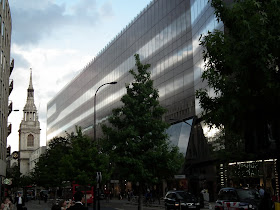
 The decorations on the main facade are conventional Art Deco, by Alfred Oakley.The pair of Mercuries over the front door distribute the news round the Empire and even to heathen foreigners, rushing away from Blighty on their winged boots as the sun rises round the globe.
The decorations on the main facade are conventional Art Deco, by Alfred Oakley.The pair of Mercuries over the front door distribute the news round the Empire and even to heathen foreigners, rushing away from Blighty on their winged boots as the sun rises round the globe. A rather arresting if cosmologically inexact image.
 Oakley probably also carved the charming and much more natural swallows.
Oakley probably also carved the charming and much more natural swallows.Oakley was the son of a chairmaker in High Wycombe and is still celebrated there. He experienced a major change in career direction shortly after the Telegraph commission - becaming a monk and exclusively specialising in religious ornamentation thereafter
High above, right on top of the building, these two rather brutal masks stare out into the middle distance.
They are called The Past (above) and The Future (below) and are the last major sculptures of Samuel Rabinovitch.
 Rabinovitch's first and only other major commission was for the West Wind on the London Underground building in Westminster. There, all the artists had carved their work directly, ie when the stone was in place rather than in a studio.
Rabinovitch's first and only other major commission was for the West Wind on the London Underground building in Westminster. There, all the artists had carved their work directly, ie when the stone was in place rather than in a studio.However, at the Underground the initial shaping was done in the studio and only the finishing was done directly. At the Telegraph, Rabinovitch went the whole hog and carved the masks from block to finished work as a medieval mason would have done on a cathedral.
Charles Elcock, the architect, apparently did not know exactly what he was up to until the scaffolding came down, which was trusting of him.
According to Rabinovitch himself: "The stern, glum, emaciated face is that of the Past, hollowed by age...(while)...the beaming face is that of the Future - young, blank and fresh."
Unfortunately Rabinovitch concluded shortly afterwards that he himself had no future in sculpture, and gave it up to become an all-in wrestler under the name Sam Rabin. Here he is, depicted by artist William Roberts being thrown out of the ring by fellow grunt-game aficionado Black Eagle.









